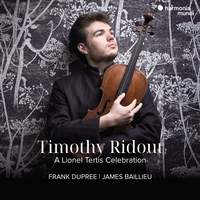Recording of the Week,
A Lionel Tertis Celebration from Timothy Ridout
Born in West Hartlepool in 1876, Tertis was nineteen before he picked up a viola: like so many converts from the violin he was persuaded to switch over temporarily as part of a string quartet, but the experiment sparked a fire within him which led to a career dedicated to raising the instrument’s profile and inspiring future generations of viola-players to set their sights beyond orchestral work and chamber music. Ridout is a direct beneficiary of Tertis's legacy, having come to prominence after winning the competition which bears his name in 2015, and has recently followed in his footsteps by being appointed Visiting Professor of Viola at the Royal Academy of Music (where Tertis taught from 1899).
It was at the Academy that the first work on this generously-filled programme germinated: York Bowen began his studies there just before Tertis’s appointment as professor, and his Viola Sonata No. 1 (written when he was just twenty) was the first of several responses to the older man’s thirst for new repertoire. Premiered by composer and dedicatee in 1905, it’s a large-scale, dazzlingly ambitious work which often tips the cap to Brahms and exploits the technical capacities of both instruments to the max (Bowen was a hugely gifted pianist, and Ridout’s partner Frank Dupree meets every challenge without seeming to break a sweat).
The pair have the full measure of the first movement’s complex architecture, and find a wealth of different shades and textures in repeated phrases and sections; in particular, it’s a treat to bask in the range of colours which Ridout draws from his middle and lower registers here, his overall sound noticeably less brawny than it was on that recording of the Elgar concerto now that he’s not working hard to project over an orchestral backdrop conceived for a more powerful instrument.
The first of two short pieces by Tertis himself follows: namely Sunset, a charming muted miniature which showcases the instrument’s singing upper register and would sound right at home in an Edwardian salon. A string of his arrangements of popular works by Fauré, Schumann, Brahms and Mendelssohn also come off beautifully, as do two puckish little pieces by the blind Blackburn organist William Wolstenholme (which Tertis transcribed from the originals for organ, to the composer’s great delight).
Alan Arnold’s transcription of Kreisler’s Praeludium and Allegro is a real gem, with Ridout providing ample proof (if proof were needed) that the viola can match its more glamorous cousin for agility and firepower, and also neatly referencing Tertis’s admiration for the American violinist: Kreisler was a major influence on his style and technique, and their 1924 performance of Mozart’s Sinfonia Concertante at the Royal Albert Hall was one of Tertis’s personal career-highlights.
Other stand-outs include the stormy Rhapsody by William Henry Reed (a violinist with whom Tertis played quartets) and Tertis pupil Eric Coates’s gorgeous, Hollywood-ish First Meeting (Souvenir) – reconstructed by none other than Coates aficionado John Wilson. (James Baillieu partners Ridout for this stretch of the programme, and is every bit as sensitive and stylish as Dupree was in the earlier section).
Rebecca Clarke’s 1919 sonata – perhaps the best-known in the viola repertoire – closes out this thoughtfully-planned recital in fine style. Another former student of Tertis, Clarke was gushingly informed by her teacher that she had ‘saved the viola!’ with this brilliantly-crafted, French-accented work, though his promised advocacy appears not to have extended beyond a couple of performances. Ridout and Baillieu embrace it with wholehearted enthusiasm, revelling in the virtuosic writing of the second movement and vaulting across the finishing-line with aplomb. Could another Ridout/Tertis awards triumph be on the cards for 2024? I’d say the odds are good.
Timothy Ridout (viola), Frank Dupree (piano), James Baillieu (piano)
Available Formats: 2 CDs, MP3, FLAC, Hi-Res FLAC, Hi-Res+ FLAC




